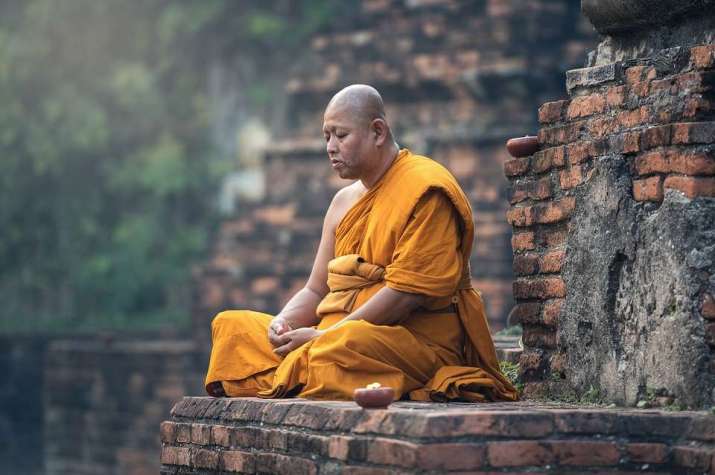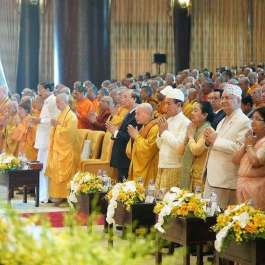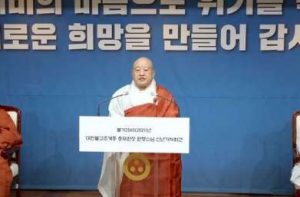
Near-death experiences (NDEs) are profound psychological experiences that have been reported for millennia, and are increasingly the subject of empirical research. Since researchers can’t predict when people will have NDE’s, research has so far focused on finding people with an NDE and asking them to describe it, sometimes years after the fact. However, a new study, published this month in Mindfulness, suggests another approach: the study of meditation-induced near-death experiences (MI-NDE), a phenomenon referred to in ancient Buddhist texts, that might make research into NDEs more empirically accessible. More significantly, the study suggests that meditators can learn and perfect the experience of an MI-NDE.
“The practice of using meditation to gain a better understanding of death is longstanding, particularly in Buddhism where ancient texts exist that aim to help spiritual practitioners prepare for, or gain insight into, the process of dying,” said William Van Gordon, a psychologist, meditation teacher, and one of the authors of the study. (PsyPost)
“However, to date, no study has sought to investigate whether this practice is ongoing, what psycho-spiritual changes it elicits, and why some advanced meditators choose to engage in it.” (PsyPost)
The study, titled “Meditation-Induced Near-Death Experiences: a 3-Year Longitudinal Study,” followed 12 Buddhist monks and laypeople, all advanced meditators, for a period of three years. To be included in the research, the meditators had to score at least seven (the standard cut-off for identifying a near-death experience) on the Greyson NDE Scale, which is commonly used to study NDEs.
The researchers assessed the NDEs the participants experienced, and the themes and phases they described, in a series of semi-structured interviews.
“All participants reported that the MI-NDE began with them consciously reducing the degree of connection to their physical worldly body. Participants referred to this as a process of ‘gradual dissolution,’ letting go of body,’ or ‘becoming untied,’” the research article reads. (Mindfulness) “[D]uring the next phase of the MI-NDE, they ceased to be aware of time and space. More specifically, participants explained that rather than becoming unaware of time or space, they realized that time and space are relative phenomena that ultimately do not exist.” (Mindfulness)
The third phase, the study reports, “involved encounters with non-worldly realms and beings… realms of ‘torture’… where the beings ‘hang from ropes’… and ‘hungry ghost realms'”. (Mindfulness) And finally, the meditators described entering a state of “emptiness”, “voidness”, and “non-self”. (Mindfulness) All the participants mentioned that they remained aware and in control of the experience. They could decide when it began, and when they wanted to end it, and some were even in control of the content of the NDE.
“Unlike regular near-death experiences (NDEs), participants were consciously aware of experiencing the meditation-induced NDE and retained control over its content and duration.” Van Gordon explained to PsyPost, adding that the findings ““demonstrated that the profundity of the meditation-induced NDE increased across the three-year study period, suggesting that the experience can be learned and perfected over time.”
While it is not clear whether everyone can learn how to induce and perfect near-death experiences, Van Gorden is hopeful that the study could help further research into the phenomenon of an NDE: “A key implication is that the present study shows it would be feasible – and ethical – for future research to recruit advanced meditators to assess real-time changes in a person’s neurological activity during a near-death experience. To date, the health risks and ethical challenges associated with conducting such a study in those experiencing a regular near-death experience have made this impossible.” (PsyPost)
Reference
Van Gordon, W., Shonin, E., Dunn, T.J. et al. 2018. “Meditation-Induced Near-Death Experiences: a 3-Year Longitudinal Study”Mindfulness. 9(6):1794–1806.
Read more
Study of advanced Buddhist meditators suggests inducing near-death experiences can be learned and perfected (PsyPost)
You Can Meditate Yourself Into A Near-Death Experience (And If You Practice, You Can Get Better At It) (IFL Science)











